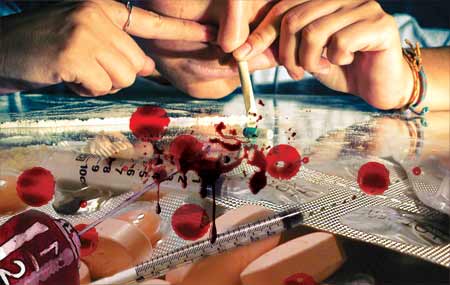High Way to Destruction
Kashmir is losing a generation to drugs, with medicinal opiates being the most abused substances to get a high. Social stigmatization is keeping many from seeking professional help to overcome the problem. Ibrahim Wani reports in KashmirLife Magazine.(www.kashmirlife.net) When his parents found out, it was already too late. At 15, Q had been a drug addict for three years already. It came as a pure shock to them. He had everything – education in a top private school, access to every facility, no monetary problem, and yet he had come to this. Both the parents are employed, the father, a gazetted officer and mother, a school teacher. They would not have known at all if Q had not taken 26 tablets of Spasmoproxyvon – an addictive pain killer. The next day he did not wake up in the morning.
Miraculously, he still had a pulse and his parents rushed him to the hospital. The parents came to know of the addiction only at the hospital. The doctors washed his stomach, and when he was stable again, recommended him to the drug de-addiction centre in PCR. When his treatment started, everyone was baffled by what he revealed. “We just could not believe what he was saying,” says a counsellor from an NGO who met him during treatment, “Everything which could have gone wrong had gone wrong and it remained hidden from everyone else. No one in his family knew anything.”
Q had started smoking at 13. “We were a group of 14 friends, of almost the same age except two, who were above 23,” he said. It was these two who had introduced drugs into the group. Smoking was just the beginning.

“First I only smoked,” he said, “then I was lured to other things.”Correctional fluids were the first things he tried. Fumes of Toluene, the diluting agent, commonly called the thinner, would continue being his addiction for a long time, since it was easily available. He would easily get the fluid from the stationer outside his school. He was not the only one in the school using the substance. At that time he was in 7th class. “The stationer would charge big amounts for the eraser fluid. I have even paid 300 rupees for the thinner bottle. Normally, the bottle sells for just 28 rupees along with the white fluid bottle,” says Q. Since it is easily available the use is widespread. Q further reveals that they used to apply the thinner on their neck ties, and kept smelling it during class. “No one knew what we were doing. You must have seen a number of school students at bus stops or outside schools doing the same. All this is done openly and no one has a hint about it,” he adds.
Then a time came when the fluid had no effect on Q. He shifted to codeine-based cough syrups also called corex – an addictive cough syrup. Experts say that codeine addiction is very high in Kashmir, with some estimating that more than 6000 codeine bottles are sold every day in the valley. What started from half a bottle at a time, kept on increasing. “At one time I took seven bottles one after other,” says Q, who was in 8th class by this time.
“But soon I went on to other things,” he adds. He also tried Iodex and boot polish, which too are easily available. “These substances are applied to bread, and then eaten,” he reveals. New people would join the group and then introduce new ideas and ways. “Once we applied Fevicol to polythene, and then burned it. We inhaled the smoke and smoked the urn along with cigarettes,” he says.
Q tried everything he could lay his hands on, and whatever was supplied and taught to him by the group. Soon he graduated to hardcore drugs like cannabis, brown sugar and heroin. “Supply was easy because everyone in our group was part of some other group. It was like a network,” he says. But the supply dried up for Q, because the family shifted to a new residence, where he could not get in contact with the group often. “A friend who lived nearby was my only persistent source then,” he says, “and he mostly had access to medicinal opiods.”
Medicinal opiods are drugs sold through pharmacists, which become addictive in high dosages, even though the function is primarily medical. At one time he even used the fortwin injection (pentazocine lactate) -an injection meant to relieve labour pain. Even though most of these drugs are prescription drugs, they are sold openly in the market and are sold to anyone who is ready to pay. “To pay for the drugs I sold my mobile phones, even stole money,” he says.
In school his grades dropped, and from a student who secured distinctions, he became below average. He just managed to pass. “During all this his parents hardly cared,” says the counsellor from the NGO, “they would be busy with their work, and hardly paid him any attention. He wanted some sort of attention from the parents and not just a private school education.” Once when his uncle had caught him smoking, his parents had come down heavily upon him, so much so that he had received a good thrashing and he had fled home for a day. But next day he had returned and promised not to smoke again. “Even at that time he befooled the parents. They should have tried to talk instead of beating him, and tried to understand and talk to him,” adds the counsellor.
Two months after the beating, Q was in hospital with drug overdose. Now he is undergoing treatment. The parents too have been counselled. “It is then often the behaviour which the addict faces in home which determines what would be his state, would he be okay, or go into a relapse.” The counsellor says that in many cases parents start blaming each other, and this often leads to discord in the family. “This in turn makes life much more difficult for the addict who is trying to become normal again,” he adds. According to Dr Wiqar, who has worked with the drug de-addiction centre in PCR as a medical officer, 60-70 percent of the cases who come to the centre are those who are in the age group of 15 to 25. “Most of them are school or college going students,” he says. Dr Muzaffar, clinical psychologist at the same facility says that a number of cases are from the elite schools in Srinagar. “Some of them are even admitted in the centre,” he says.
Tragic stories of addiction
 T
The story of 22-year-old M is tragic. At 20, he had to leave college after his father died, and left his family no source of livelihood. He was left with no choice but to start earning as he had to care for an ailing mother and a younger brother. Luckily, he found a business partner. Both of them pooled together their savings and headed to Goa to start a business of Kashmiri handicrafts. The business clicked and he started making good money, most of which he sent back to his family. The money paid for the medical expenses of the mother and education of the brother. But for M, away from family, the work was very hectic.
Long working hours started taking its toll on him, and he started falling into depression. His partner took him to a dance club. Here M struck a friendship with a girl. M would come again and again to meet the girl in the club. They became intimate. As the girl would drink, he too started drinking. After trying different liquors, he graduated to drugs as the girl was an addict.
Initially the addiction did not affect him much, but soon it became impossible for him to control the urge. “I started taking alcohol and drugs even during my work hours,” says M. The business started getting affected. Soon he was not in a situation to even be at the shop, and they started turning up losses. The partnership broke, and M did not have any money left. He called home and asked for money saying that the business needed some investment.
His mother, who had no money to send, called a family friend who was also settled in Goa. The friend went to visit M, but found him in a different state. He gave him some money for the journey back to Kashmir, and made sure he would do it. On his return, the family was shocked. “I saw what my addiction did to them. I tried to leave drugs but I could not. It was too difficult,” he says. The withdrawal symptoms were too harsh to bear. He craved for drugs he took in Goa like brown sugar, but the cost was too high. “Instead I started taking medicinal opiods,” says M.
The mother decided to send the other brother to work, even though he had just passed his 12th class exam. He was sent to Delhi to earn. The family had no other option. But this would be more tragic. After he reached Delhi, he went missing. Ten days later they were informed that he had died under mysterious conditions. M went to collect his body. Every one blamed M for the death. He went from bad to worse, and started taking more and more drugs. His condition became very unstable and he had to be admitted to the hospital. From there he was referred to the PCR drug de-addiction centre. Now M is undergoing treatment and the family friend who had helped him to return to the valley, is helping him to stand on his feet again. But the relapse rate is more than 30 percent.
“Most of the patients who come to the centre are able to recover, but in some cases there is a relapse, when stress conditions recur or continue,” says Dr Wiqar. Dr Muzaffar agrees. He remembers three cases where patients relapsed and ultimately died. “The dead body of one of the three was found in an auto (rickshaw). He died of drug overdose. He was just in early twenties,” he says. The addict had run away from the centre without completing the treatment. “In one other case, a person became completely fit, married and even had children,” says the doctor. The patient was in early thirties. “But due to some problem in the family he could not control it, took an overdose and died,” he says. He had once been selected to train with the Indian Hockey team.
Among Girls Too
She was among the toppers in her class. B, a student of an elite missionary school for girls in Srinagar which often tops merit lists in secondary school examinations, started with a cigarette puff.“I was just trying it for fun,” says B who is a daughter to a top notch businessman from Kashmir. The family owns handicrafts showrooms in Srinagar as well as Delhi.
The first time she smoked, she was 14 years of age and a student of 8th standard. “Some of my friends took it secretly, and it became a curiosity for me. So I asked for a cigarette from them and then tried it,” she says. But cigarettes did not catch up much with her. What would follow would leave a lasting effect on her life. “I went to a school friend’s house for a night. We had to prepare some notes,” she says. It was midsummer and the temperature was high. “My friend offered me can of beer, and said that it would refresh me,” she says. Initially she was hesitant, but her friend started taunting her. “I was not able to control it when she said that I was a ‘kiddo’. I took it,” she says.

She liked the taste and the feel it gave her. Soon they started visiting each other’s houses regularly. The friend arranged beer from a contact at Boulevard and a shop in Rajbagh paying much higher than the market rate. But it remained limited to beer for some time. The next step for her came when she visited Delhi along with her parents during winter holidays. Her friend told her about the easy availability of beverages in the metro and suggested her to taste alcohol.
One day when her parents had to go on a party, B took a servant girl into confidence and gave her money to get drinks. She gave her a big reward when she brought bottle. When she took the drink the first time, she passed out and would not wake up for more than 10 hours. She had locked the room from inside. When her parents returned from the party, they thought that she was already asleep and did not disturb her till morning. Over the course of B’s stay in Delhi, the servant girl earned much more than what she would have earned in a year.
When she came back, she teamed up again with her friend. Beer was replaced by ‘more thrilling’ alcoholic drinks arranged by her freind’s ‘contact’. The drinks would reach them in cold drinks bottles. But at the time of exams, when she needed the drinks most, the supply dried up. The friend cited various difficulties in procuring. But B was adamant.
“I would pay anything,” said B but in vain. Instead the friend offered a powder, and said that this would relax her a bit. The powder was brown sugar. When she took the drug, she would remain unconscious for hours. As a result her studies suffered. Her parents thought that she was unwell, and felt that she needs medical attention. But she resisted. When the results of her exams came out she had just scored 60 percent marks, a far cry from the above 90 percent she secured normally. Her teachers were worried, and contacted the parents. But they thought that her marks were low because of her “illness”.

Now in her tenth class, she would try to study, but she found it hard. Her addiction kept growing. One night when the parents thought that she would be studying late, the mother brought her tea after dinner. But she found that she was a bit drowsy. She said that she would take the tea herself and the mother should go to sleep. The mother left. But out of concern the mother visited her again an hour later. What she found shocked her. “I found that she was sleeping on the study table itself, with her head on the book,” she says. The cup of tea was at the same place she had kept, and was still full. But mother saw some powdery substance which had fallen down. Alarmed she called the father. When he saw it, he knew what it was.
 Thus the Islam in Kashmir has its own indigenous
character. The majority of Muslims deeply revere and love their faith, at times
quite fanatically. There had been attempts to reconvert Muslims of Kashmir to
some other faith, as they had been Hindus and Buddhists at various times, even
by Maharaja Gulab Singh, the founder of the present State of Jammu & Kashmir
and Dogra dynasty, who tried to reconvert the inhabitants of valley to Hinduism,
but the Brahmans abhorred him from any such practice. The Christian
Missionaries used to visit and work in Kashmir where they established various
educational institutions and hospitals during the Dogra rule. The name of Dr
Knowles, C.E Tyndale Biscoe, author of Kashmir
in Sunlight and Shade, Miss Muriel P. Mallinson and many others are worth
mentioning, for their contribution towards educational upliftment and
humanitarian welfare for the inhabitants of Kashmir. Even if they were
missionaries, but they didn’t indulge in proselytizing activity on a mass scale
or either the Kashmiris weren’t willing to convert to some other religion? This
question needs to be answered by historians!
Thus the Islam in Kashmir has its own indigenous
character. The majority of Muslims deeply revere and love their faith, at times
quite fanatically. There had been attempts to reconvert Muslims of Kashmir to
some other faith, as they had been Hindus and Buddhists at various times, even
by Maharaja Gulab Singh, the founder of the present State of Jammu & Kashmir
and Dogra dynasty, who tried to reconvert the inhabitants of valley to Hinduism,
but the Brahmans abhorred him from any such practice. The Christian
Missionaries used to visit and work in Kashmir where they established various
educational institutions and hospitals during the Dogra rule. The name of Dr
Knowles, C.E Tyndale Biscoe, author of Kashmir
in Sunlight and Shade, Miss Muriel P. Mallinson and many others are worth
mentioning, for their contribution towards educational upliftment and
humanitarian welfare for the inhabitants of Kashmir. Even if they were
missionaries, but they didn’t indulge in proselytizing activity on a mass scale
or either the Kashmiris weren’t willing to convert to some other religion? This
question needs to be answered by historians! 



























